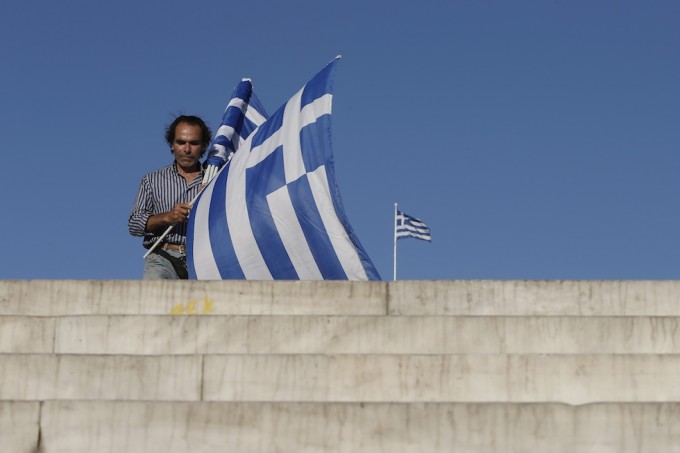EUROPE
Past August 20 Greece exited the financial assistance program of the EU enforced in May 2010 to address the country’s dramatic debt crisis. Is the crisis really over? Has a period of renaissance begun for the Greek people? For Father Ioannis Patsis, Vice President of Caritas Athens, this is not quite the case. He launched an appeal through SIR: “We are making cuts in all areas, even among our staff members, but it’s not enough. Help us!”

“Offertory baskets in church are never empty. People never decline my requests for help. They give whatever they can to those in need, the young and the old, foreigners and Greek citizen, Christians and Muslims. We are all sons and daughters of God. Generosity is great even in such a long-standing dramatic situation. But it’s not enough.”
For Father Ioannis Patsis, serving as Vice President of Caritas Athens for the past two years, today’s Greece is somewhat like “the poor widow of the Gospel who gave everything she had to the Temple. That small amount of money was all she had.” Father Patsis is also a parish priest at St. Paul’s church in the Piraeus, a mission that every day brings him close to the people and their needs caused by what appears to be a never-ending financial and economic crisis. The situation didn’t change after August 20th, when Greece exited the European financial assistance program launched in March to address the country’s dramatic debt crisis.
Caught in a tunnel. “With a debt of over 288 billion euro to be repaid to the Troika (ECB, IMF and EU) – the priest pointed out – it would be wrong to say that Greece has overcome the crisis. We are still inside the tunnel and it’s hard to see the light at the end.” This gridlock has many different causes, mentioned by Father Ioannis in the form of a long list: “Our Country has no industries, the building sector is stalled, businesses are closing down, investments are a mirage, high numbers of refugees and asylum seekers – approximately 50 thousand have entered the country to date – from Syria, Afghanistan, Africa, Albania, and now also from Turkey. In the past two years some 5000 Turks have requested political asylum from Greece.” Worse still, ours is an ageing population. Today receiving a pension is a major achievement. Pensions have been reduced to a minimum after 13 cuts and with the 14th monthly payment probably coming in not before January 2019.” To conclude, “it’s very hard to live in Greece today, you need to pray and hope you have the strength and the heath to cope with this situation.”
 EU periphery. Greece today has become the extreme periphery of the EU. The Vice President of Caritas Greece is angered about this. “We should have not entered the euro zone. We didn’t have the means nor the possibility. The government led at the time by Socialist PM Kostas Simitis altered data on public finances to join the Euro in 2001.” In fact Greece is at the bottom of the list in Transparency International’s annual index, which ranks countries by their perceived levels of public sector corruption. For the Greek people the time has come to carry out an examination of conscience. Father Ioannis admits that “as Greeks we weren’t smart enough to understand that we were living well above our possibilities. A large part of the population started taking huge loans from banks to maintain the same standard of living, which they could not afford otherwise. If you don’t repay your debts banks can go so far as to take your life.” Now it’s pointless to cry over spilled milk. The fictitious affluence granted by credit cards today has left room to “nervousness, suffering, lack of hope in the future.
EU periphery. Greece today has become the extreme periphery of the EU. The Vice President of Caritas Greece is angered about this. “We should have not entered the euro zone. We didn’t have the means nor the possibility. The government led at the time by Socialist PM Kostas Simitis altered data on public finances to join the Euro in 2001.” In fact Greece is at the bottom of the list in Transparency International’s annual index, which ranks countries by their perceived levels of public sector corruption. For the Greek people the time has come to carry out an examination of conscience. Father Ioannis admits that “as Greeks we weren’t smart enough to understand that we were living well above our possibilities. A large part of the population started taking huge loans from banks to maintain the same standard of living, which they could not afford otherwise. If you don’t repay your debts banks can go so far as to take your life.” Now it’s pointless to cry over spilled milk. The fictitious affluence granted by credit cards today has left room to “nervousness, suffering, lack of hope in the future.
The Greek people are living in the hope to move forward in some way or another.
Life seems to have come to halt, as evidenced in the decrease in marriages and live births and the increase in the number of deaths.”
 Today’s Greece is a plethora of minus signs. The Greek Central Bank estimated that 500 thousand Greek citizens, almost all of them with a high level of education, have emigrated abroad with their families. Since 2008, Greece’s GDP dropped by 28%. It started growing again only last year, but below expectations. Despite minor increases unemployment rates remain seriously low: from 27% in 2015 to 21% in 2018. Government debt is equivalent to 190% percent of GDP as a result of the loans granted by the Troika and by banks now overburdened by unpaid instalments. Thus also the boom of the tourist industry –with 30 million tourists in 2018 – risks amounting to almost nothing. “It’s a touch-and-go tourism for the great part, leaving few resources in the Country and marked by seasonal employment”, the priest remarked.
Today’s Greece is a plethora of minus signs. The Greek Central Bank estimated that 500 thousand Greek citizens, almost all of them with a high level of education, have emigrated abroad with their families. Since 2008, Greece’s GDP dropped by 28%. It started growing again only last year, but below expectations. Despite minor increases unemployment rates remain seriously low: from 27% in 2015 to 21% in 2018. Government debt is equivalent to 190% percent of GDP as a result of the loans granted by the Troika and by banks now overburdened by unpaid instalments. Thus also the boom of the tourist industry –with 30 million tourists in 2018 – risks amounting to almost nothing. “It’s a touch-and-go tourism for the great part, leaving few resources in the Country and marked by seasonal employment”, the priest remarked.
“We are losing the best human resources in the Country. There is a brain drain that will not be recovered. Families will find what they no longer have abroad, namely, high-level education, appropriate health care, dignified pensions and stability. Why should they return?” argued Father Ioannis, who highlighted increased alcohol and drug consumption rates among the population at large, “the medicines of desperation.” As relates to medicines: “Medical treatment in Greece today is impossible, trying not to die is the best we can yearn for. Shortage of hospital beds forces patients to sleep in corridors. There are huge waiting lists for medical exams along with a shortage of bed linens and medicines. Healthcare services were cut by 50%, so those who can afford it seek health treatment in private medical centres.” The vice President of Caritas Greece remarked: “How can we declare that we have overcome the crisis when 35% of the Greek population live below the poverty threshold? Can we really make such a statement?” He smiled bitterly.
Lack of humanitarian aid. The bitter truth is that more cannot be done to help those in need. The country is facing a lack of humanitarian aid and assistance. In this mission Caritas Greece and Caritas Athens are supported also by Caritas Italy that is carrying out town twinning programs along with 4 national programs based on the advancement of counselling centres and poverty observatories, on experiences of social economy to create job opportunities, on training programs for the civil commitment of the young and on the creation of multipurpose centres to meet social, individual and community needs of Greek families and refugees.
“As Caritas we opened our arms to donate until we still had something to give. But we were forced to keep these services closed, we are left with practically no humanitarian aid”, remarked Father Ioannis,
in charge of the soup kitchen in Athens where, he said with pride, “we have been serving over 600 warm meals a day, 12% of those who ask our help are Greek citizens. But the funds will last only until December 31st. Then we will be left with nothing. We will have to shut everything down. It will be impossible to offer this service without external help. That’s why I call upon everyone: please help us, we can no longer provide assistance. We are making cuts in all areas, even among our staff, but it’s not enough. Help us!”
“All we have left to give is the love of Christ which – it’s sad to say – does not satiate hunger.”
The words of Father Ioannis don’t convey surrender: “We are still left with the generosity of the Greek people, the generosity of the widow in the Gospel. Until we have this we can continue to hope in a better future for Greece.”